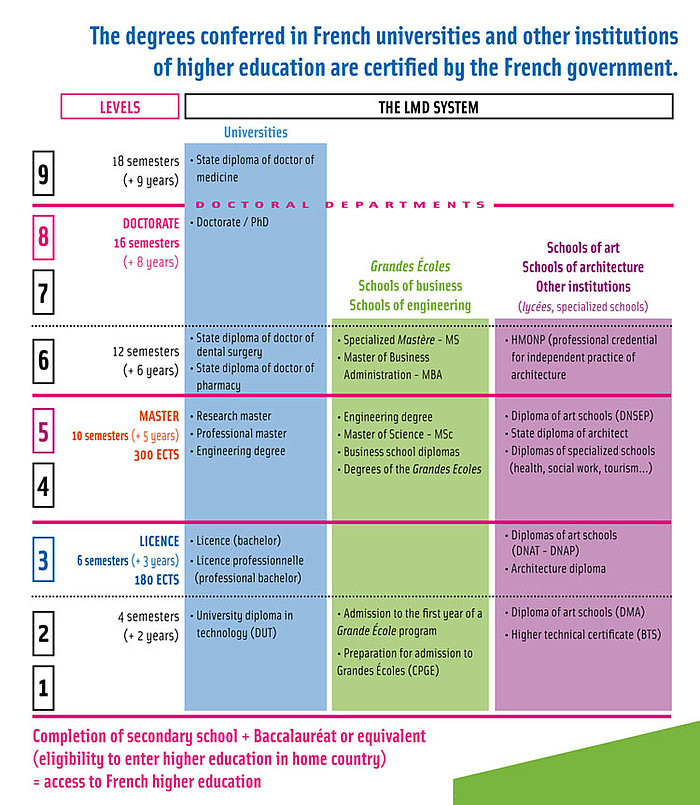International students
You are 24,000 foreign students to have chosen Lyon as their place to study! Welcome! Lyon Métropole greets you warmly and is ready to provide support for your new life as a student.
The French educational system
To understand how the French higher education system is organized, have a look at the following organization chart showing the various types of training programs that exist and the number of years they involve. To learn how to apply for enrollment in an establishment of higher learning in France, see the summary prepared by Campus France.

ECTS credits
You will earn ECTS credits with your studies. These credits validate education on the European level and encourage exchange between European countries. With ECTS credits, it will be easier to find an equivalent for your diplomas if you decide to work in another country. The validation of your year and your degree depends on obtaining a certain number of ECTS credits.
The Campus France portal

Campus France is a website designed for foreign students studying in France. On the site, you will find information on mandatory administrative formalities, applications to fill in and reports from former students who studied in France.
Campus France offices exist in a number of countries; find out whether a Campus France office is present in your country.
Entering your establishment
Each university has an International Relations department or an Office of Foreign Affairs. At the start of the school year, your establishment will give you the name of your administrative contact for all questions or issues that may arise during your academic stay in Lyon.
To welcome you properly, a number of universities and schools offer festive get-acquainted weeks for foreign students and/or students who work so that they can get to know the campus, campus services and the city.
Good to know
There is no automatic equivalence between foreign and French diplomas. When you apply for admission, you can request an equivalence that will evaluate the number of years of French higher education that correspond to your studies in your home country. Only the establishment of higher education to which you apply is qualified to determine the level of equivalence.
The Students Welcome Desk
The Students Welcome Desk supports international students with their administrative procedures related to residence permits via a multilingual hotline open for 2025 from August 25 to December 19, Monday to Friday from 9 a.m. to 5 p.m., to answer all questions: +33 (0)4 37 37 43 00.
The website of Students Welcome Desk
Outside of this period, international students wishing to request assistance with administrative procedures (visas, residence permits, etc.) should contact their university first.
Your visa/residence permit procedures
The visas
Depending on your situation, you may need to obtain a visa to study in France:
Originally from a European Union country?
You do not need a visa or residence permit. Check directly with your higher education institution for the required supporting documents for your enrollment. Holding a residence permit does not grant you any additional rights.
Originally from a country outside the European Union?
Find out about all available visas and how to apply on the Campus France website.
See the list of countries and territories covered by the EEF (Etudes En France) program here.
Follow the online application process on the French visa website.
- For training courses lasting less than 3 months, you will be issued a short-stay visa;
- For training or courses lasting longer than 3 months, you will be issued a long-stay visa, which is equivalent to a residence permit, subject to formalities upon arrival in France.
To translate official documents, such as your diplomas, find the online list of approved translation centers in Lyon.
Submission procedures:
Submission procedures and deadlines vary depending on the document held by the user and their situation.
There are two options for submitting your residence permit application:
> Online submission on the ANEF digital platform
> Online submission on the "simplified procedures" website, with an invitation, or, if applicable, in person at the prefecture counters
Your certificates:
With the ANEF electronic procedure, you no longer need to issue a receipt. The online procedure and online submission generate several certificates that demonstrate the progress of the process and ensure compliance:
- Confirmation of application (provides proof of application but does not confirm the legality of the stay)
- Certificate of Extension of Instruction (ADP) (retains students' already acquired rights but is only valid with the TDS for renewal - for first-time applications, it does not allow travel or the acquisition of new rights).
Then the student will receive a text message (within a maximum of 2 months after the ADF is issued) informing them of the availability for collection of their residence permit. Students must make an appointment online on the Rhône Prefecture website to collect it.
Refugee (or Ukrainian) Students
To learn about your rights and the procedures to follow in France, find all the information you need to enroll in a higher education institution. Students who are beneficiaries of international protection (BPI) - refugees, subsidiary protected persons, or stateless persons - must submit their TSE application to the ANEF (National Education and Training Center) by selecting the reason "beneficiary of international protection." Ukrainian nationals who are beneficiaries of temporary protection (provisional residence permit) can apply for a change of status to a TSE Law Student with a visa exemption via the "Simplified Procedures" website: "First TSE Application."
Conditions of delivery
The law governing foreigners is now consolidated in the Code of Entry and Residence of Foreigners and the Right to Asylum (CESEDA).
An exclusive agreement has been concluded with Algeria, and agreements with specific provisions/common law apply to Tunisia, Morocco, and certain sub-Saharan African states.
The duration of the Student TSE depends on the course of study: Multi-year residence permit (CSP) from 1 to 4 years max, or 1 year for Algerians - CAP/French courses/Bachelor's degree and Bac +1 to Bac +3: end of December - Master's degree and Bac +4 to Bac +5: end of January - Doctorate and Bac +6 to Bac +8: end of February
You must:
> be resident in the Rhône department (proof of residence (electricity, gas, internet, home insurance bill, etc.) dated within the last 6 months in the student's name)
> demonstrate sufficient resources: €615 per month
> present a certificate of enrollment from a private or public institution or a professional training organization (distance learning and short-term training (DU) are not accepted).
> demonstrate attendance and exam attendance
The different situations
- Have you just arrived in France?
Do you have a VLS-TS (long-stay visa equivalent to a residence permit) for the 2025/2026 year?
> You must validate your VLS-TS within 3 months of your arrival in France on the ANEF online platform.
Once your VLS-TS is validated, you will receive a confirmation email including an identification number (AGDREF number). Please note: if you do not complete this process, you are in an irregular situation and will not be able to submit a renewal application.
- Have you just arrived in France?
Do you have a VLS or D visa?
> You must submit your application online on the ANEF platform: Algerian nationals > within 2 months of arrival in France and before the expiry of the visa and for students on a mobility program > within 2 months of arrival in France and before the expiry of the visa
- Are you a student in France and would like to renew your residence permit?
Do you have a valid VLS TS or TSE residence permit that is about to expire and would like to continue your studies in France?
> To renew your permit, you must submit your application online on the ANEF platform. No need to travel! No application needs to be submitted in person to the Prefecture or the University of Lyon.
Submit your application no earlier than 4 months and no later than 2 months before the expiry date of your residence permit. A late payment penalty of 180 euros will be applied upon withdrawal of the card if the application is submitted less than 2 months before the expiration of your previous permit. Submit your renewal application even if you do not yet have your final registration. If your renewal is more than 6 months late, you are considered to be in an irregular situation.
Other situations: C visa competition - Holders of an EU RLD card - Holders of an MAE (Ministry of Foreign Affairs) card - Minors in school - Residence permits expired more than 6 months ago - Holders of a short-stay visa - Regularization applications (visa-free entry, etc.) > You must apply online, via the "Simplified Procedures - 1st TSE Application" website, for an appointment to submit your application at the prefecture counter. Please note! If your application is incomplete, you have 30 days (reminder D+15) to complete your application. If you do not have the necessary missing document, do not hesitate to attach a letter explaining the delay. If you do not do so, the application is automatically closed and cannot be reopened. You can only submit a new application through the ANEF if the TSE has expired less than 9 months ago.
If you encounter any difficulties
- As a priority, contact your DRI.
- If you encounter any difficulties submitting your application to the ANEF, call the Directorate General for Foreigners in France at 0806 001 620 or contact the Citizen Contact Center (CCC) via the contact form, where you can attach screenshots (URL, date, and time visible) with the error message.
- If the Citizen Contact Center was unable to provide a solution, contact the Rhône Prefecture. Select the "student" reason and attach a screenshot of the error message on the ANEF.
- Consult the Students Welcome Desk FAQ
- Consult the ANEF FAQ
Good to know: It can take four months to process your application at the prefecture! If you submit your application in May/June and have not heard anything by September, this may be normal. In the meantime, you will receive an ADP. Your stay is considered irregular if you are more than 6 months late in renewing your stay.
Financing your stay
The cost of your studies in France depends on several factors: the public or private status of the higher education institution to which you are applying, the level of the integrated program, country of origin, etc. Find details on the costs of higher education in France.
- There are many financial aid options available to finance your studies in France. You can search for the financial aid you are eligible for depending on your country of origin on the Campus France scholarship website. For example, you can apply from September to January for the Eiffel Scholarship if you are pursuing a Master's or Doctoral degree (from October to January), for the Labex MILYON (from October to January) if you are pursuing a Master's or Bachelor's degree in one of the programs offered by the University of Lyon institutions supported by the Labex, or for the Ampère Excellence Scholarships call for applications if you are pursuing a Research Master's degree at ENS de Lyon.
- You can apply for an Erasmus scholarship or scholarships from your home region to study in the Lyon Metropolitan Area.
Your health procedures

If you are an international student arriving in France to study, you must register specifically on the dedicated website etudiant-etranger.ameli.fr. Information is available in French, English, Spanish, Mandarin, and Arabic.
If you encounter any difficulties registering for health insurance and wish to speak English, the English-language service platform is available Monday to Friday, 8:30 a.m. to 5:30 p.m., except on French public holidays. The line is also accessible from abroad: 09 74 75 36 46 (toll-free service + call charges).
List of Lyon Metropole consulates
For assistance during your stay in the area, useful contacts, and the notarizing and delivery of official documents from your home country, the foreign consulates in Lyon Metropole are a useful contact. Consult the list of over 70 consulates in the metropolitan area to find the address of your home consulate and the person to contact.
Do you want to work during your studies?
It's possible! If you are an international student, you can legally have a student job. Conditions may vary depending on your nationality (contract, duration, etc.).
With your student card and without having to apply for a work permit, you can work as a secondary employee, up to 60% of your annual working hours, or 964 hours (working hours may be distributed unevenly throughout the year). Beyond this duration, the employment contract must be part of your studies, and the employer must apply for a work permit on the ANEF online platform.
You are only authorized to work as an employee; you cannot work as a self-employed person.
A temporary residence permit for a period of 12 months, non-renewable, may be issued to certain foreign students and researchers wishing to supplement their training with initial professional experience.
Your meeting places

World Students' Night or La nuit des étudiants du monde
Every year in October, the Métropole and the City of Lyon offer a friendly, festive, and free evening to welcome international students: the Night of Students of the World. It takes place at the Marché Gare, a contemporary music concert hall in the heart of Lyon (Lyon 2nd arrondissement), and allows you to discover associations, meet new people, and enjoy free concerts and entertainment.
This year, the event will take place on october 16 from 7 p.m. to 11 p.m. upon registration.
A festive evening beginning at 7 pm with a quiz, concerts, a community village, and snacks:
- Speaking sessions at 8 pm Community Village (Nightline / UDL Ambassadors - SWD -/ Cop1 / ESN / Lyon International) from 7 pm to 9:30 pm
- Quiz with prizes to be won from 9:15 pm to 9:30 pm
- Concerts:
> Selma Kara (pop) from 8:30 pm to 9 pm
> Radical Ronron (super groovy electro-rock) from 9:45 pm to 10:45 pm
- Snacks provided Bar access throughout the evening
Student associations to welcome you
Find a list of all associations in the LyonCampus directory, including international student associations to encourage networking and discovery of Lyon:
- ESN Cosmo Lyon supports exchange students and welcomes international students through numerous events throughout the year. Sign up for the Buddy System, a referral system to find a student already in Lyon who can answer all your questions.
- Consider contacting community associations to maintain connections between students of the same nationality. Consult the directory of student associations.
- Take advantage of the free events at La maison des étudiants to participate in and meet associations throughout the year. The program can be found on the Facebook page @mdegrandlyon and on the MDE calendar.
- Coup de pouce Université Lyon supports students in their academi c work: more than 200 volunteers offer courses and workshops on a variety of topics (learning French, proofreading dissertations, written expression, conversation in different languages, and hosting visits to Lyon families). The atmosphere is intercultural and fostering exchange: international students are welcomed throughout the year and come from more than 80 different countries! Contact: +33 4 72 70 22 90 cpu_accueil(at)yahoo.fr - 1 rue Bonald - Lyon 7th arrondissement. All information
- Lyon International organizes meetings and connects international students with Lyon families to share friendly moments over a meal in a local home, often leading to a longer-term relationship. To be invited, register.
Are you familiar with the language get-togethers?
The municipal libraries of Lyon regularly organize language get-togethers serving coffee or tea.
Learning French
To study in France, you need to be fluent in the language because most courses are given in French.
Your establishment may propose French courses that are free of charge. If this is not the case, you can take intensive French courses for a fee at any level and sign up for the following language tests: DELF, DALF, Specialized DU.
To choose your French course, the centers in Lyon teaching French as a foreign language have been awarded the FLE label from the Ministry of Foreign Affairs that attests to the quality of teaching. On the Lyon Metropole campus, you will find:
• Centre International d’Etudes Françaises (CIEF) [FLE]
Université Lumière - Lyon 2, 16 quai Claude Bernard - 69007 Lyon; Contact: cief(at)univ-lyon2.fr
Full year or semester courses, specialty courses, internships, preparation for the DELF/DALF diplomas, etc.
• L’Institut de Langue et de Culture Française (ILCF) [FLE]
Université Catholique de Lyon, 23 place Carnot, 69002 Lyon
Several types of programs designed for levels from beginner to bilingual are available: monthly or by semester, semi-intensive or intensive, intensive during the summer, etc.
Find the list of establishments with the FLE label on the map of certified centers. They offer intensive courses by quarter, semester or year, as well as evening and summer classes, and provide preparation for the DELF and DALF exams. Most of them also have a service for student housing, possibly with a host family, and propose cultural activities to facilitate integration.
An application to settle in France
The free Spiky Community app makes it easy to settle in France and meet French and foreign people near you.

